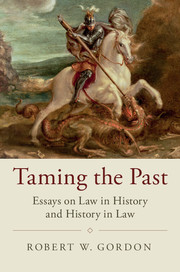New from the
Studies in Legal History Series at Cambridge University Press:
Taming the Past: Essays on Law in History and History in Law, by
Robert W. Gordon (Stanford Law School). A description from the Press:
Lawyers and judges often make arguments based on history - on the
authority of precedent and original constitutional understandings. They
argue both to preserve the inspirational, heroic past and to discard its
darker pieces - such as feudalism and slavery, the tyranny of princes
and priests, and the subordination of women. In doing so, lawyers tame
the unruly, ugly, embarrassing elements of the past, smoothing them into
reassuring tales of progress. In a series of essays and lectures
written over forty years, Robert W. Gordon describes and analyses how
lawyers approach the past and the strategies they use to recruit history
for present use while erasing or keeping at bay its threatening or
inconvenient aspects. Together, the corpus of work featured in Taming
the Past offers an analysis of American law and society and its leading
historians since 1900.
A sampling of advance praise for the book:
"The sparkling essays of one of
the preeminent legal historians of our era are now collected in one
place, where they can talk with each other. Here we see the vintage
apercus that make us laugh aloud at Gordon’s wit and nod our head at his
wisdom. So, for example, we see Gordon discussing ‘Willard Hurst’s
benign, if also rather insistent, influence;’ talking about how ‘dead
paradigms … never really get killed off [in law], but hang around and
Dracula-like, rise from their coffins to stalk the earth;’ observing
that E. P. Thompson ‘almost never (save when exposing an opponent as an
ignorant twit) showed off how hard he had been working;’ and pointing
out that ‘history does not make a good domestic pet.’ This book is a
real treat!’" --
Laura Kalman
"Once an arcane backwater,
mostly located in the backrooms of law schools, disconnected from the
main themes of academic legal study, legal history has become a site of
core controversies, ones that everyone involved with the study of law
had to engage with. Legal history is where scholars from emerging fields
of ‘non-legal’ history - including historical studies of gender, of
race, and of market capitalism - found the scholarly perspectives that
made possible exciting new work about law. The writings of Robert W.
Gordon helped guide how it all happened. American scholarship owes him a
debt of gratitude. And it is good that a new generation will be
introduced to his analytic clarity, to his wisdom, and to his attractive
voice, through this accessible edition."
--
Hendrik Hartog
The Studies in Legal History Series
website has additional content, including clips of interviews with Professor Gordon about the book.
